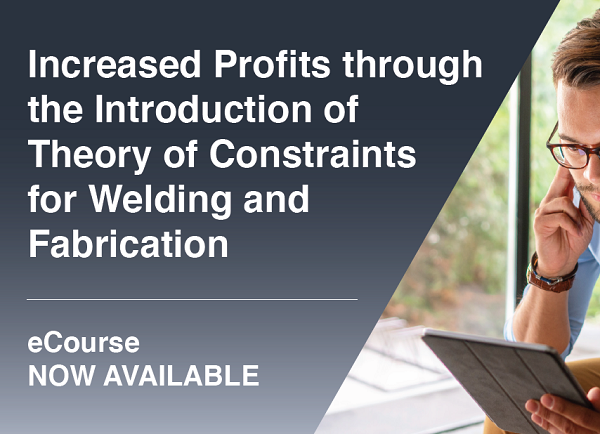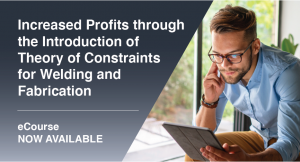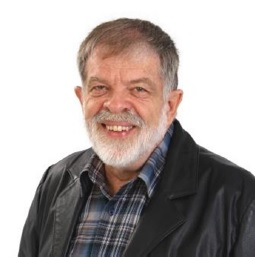Theory of Constraints for Welding and Fabrication: eTicket
$765.00 – $880.00 incl GSTIncreased Profits through the Introduction of Theory of Constraints for Welding and Fabrication



For many decades, the world of manufacturing and fabrication followed the principles of “scientific management” as developed in the late 1800s and early 1900s. Modern day business requires a much more holistic or integrated approach to be successful. Our markets and organisations are much more complex, and as a result, the way to manage it must be different. Industry 4.0 and Lean 4.0 entice a new approach with a lucrative potential-how can it be achieved?
In the late 1980s, Dr Eli Goldratt brought a new management approach that incorporates the systems’ approach in an elegant and easy-to-implement way. He published it in a business novel called “The Goal” and it introduced an approach to business that often produces astonishing results. This approach is called the Theory of Constraints (TOC), and it covers operations, projects, logistics and good management decision making. The key focus is on improving the FLOW of revenue, rather than the driving of efficiencies and costs.
This eCourse will introduce the conceptual framework contained in this new approach and then demonstrate how it can be applied in manufacturing and fabrication. The concepts of TOC FLOW Management will be explained and students will be guided on how to apply it for themselves. Ultimately the objective is to guide the company towards a journey of continuous improvement. An operational case study from the South African UMP company will be used to illustrate this. Visibility and good decision making can be improved through the Operational Flow Model and associated insights, configuration and behaviours. This aligns with Industry 4.0, which is providing new capabilities, but we need a new operating approach. In the final instance, it is all about making more money-increasing profits through TOC.
—–
E-COURSE PROGRAMME
This live eCourse will include 4 x 2 hour sessions including Q&A. The eCourse will be hosted via Zoom, with login details supplied upon registration.
For the course flyer with full course information, please click here.
To sign up for the Asia, Australasia and Middle East courses, please go to the Ticket tab.
Registrants will receive the course links before the start date.
Course Dates:
Course Part 1, 22 August 2022
Course Part 2, 23 August 2022
Course Part 3, 24 August 2022
Course Part 4, 25 August 2022
Location/time zone/starting Time
Auckland: 2:00 pm – 4:00 pm
Sydney: 12:00 pm – 2:00 pm
Perth: 10:00 am – 12:00 pm
Singapore: 10:00 am – 12:00 pm
Bangkok: 09:00 am – 11:00 am
Seoul: 11:00 am –1:00 pm
Tokyo: 11:00 am – 1:00 pm
India & Sri Lanka: 07:30 am – 09:30 am
Bangladesh: 08:00 am – 10:00 am
This live, eCourse will include 4 x 2 hour sessions (8 hours) including Q&A. The e-course will be hosted on Zoom, with 2 unique login details and passwords supplied before the course start date.
Day 1 Session 1: A review of Existing Methods to improve operational performance and why some of them do not work.
Day 2 Session 1: The alternative solution For Operations.
Day 3 Session 1: Financial and Managerial decision making
Day 4 Session 1: Configuring operations for maximised Flow
Who should attend?
Owners of manufacturing and fabrication companies; factory or workshop supervisors and first line supervisors especially of welding activities; planners, estimators and raw material purchasing personnel; welding, manufacturing and fabrication engineers; quality assurance and control personnel.
eCourse Programme
The eCourse is relevant for all professionals in steel construction, bridge design, power generation, naval and shipbuilding, pipeline, automotive, aerospace and other industries that apply welding and fabrication.
Earn PDHs and CEUs with our Professional Development eCourse
Upon completion of 4 eCourse modules, the attendees will receive an electronic Course Completion Certificate that might be used to claim PDHs or CEUs.

Arrie van Niekerk | University of Pretoria
Arrie van Niekerk obtained his B Eng (Metal) from the University of Pretoria in 1978 and B Eng Hons in 1985. He completed the Management Development Program at the University of Pretoria in 1987. He was a part-time lecturer in Welding Technology at the Technikon Pretoria and University of Pretoria until 1989 and is currently lecturer of MSc in Mineral Resource Management at the University of the Free State. He is a member of the South African Institute of Mining and Metallurgy, he served as council member on the South African Institute of Non- Destructive Testing and served in various positions at the South African Institute of Welding. During this period, he was awarded the Harvey Shacklock gold medal for the development and certification of steel for the Mossgas Offshore production platform. Arrie is a specialist Facilitator of the TOC (Theory of Constraints) in Mining and was the project leader for the implementation of TOC in more than 90 mines and 20 manufacturing companies since 1994. Over the past 20 years, he developed a derivative of Theory of Constraints (TOC) called TOC Production Flow and this approach is producing remarkable improvements in many companies all over the world. TOC Production Flow has started using Wi-Fi-linked measuring devices and advanced discreet event simulation called MineTwin for some mining operations, placing this application in the forefront of Industry 4.0. This eCourse aims to demonstrate how this can be done in Fabrication and Manufacturing.
eCourse Cost
The course registration fee per participant is $500.00 payable in US dollars or the equivalent amount in New Zealand currency. Participants will receive a set of notes for each course part in pdf format.
NOTE: As a special benefit to CWB, SAIW,IIW-India and HERA Certified Companies as well as IIW MCS ISO 3834 certified companies, the registration fee of US$500.00 per company will allow your management team to attend in the same room for the eCourse. This is to enable the information and experience being transferred by Arrie van Niekerk to reach all the key people in your company who will be involved in applying it. One person from the company is sufficient to register and receive the set of eCourse notes and final certificate.
HERA members: As this course is facilitated by an external and international organiser versus HERA, it is important to note that member discounts do not apply for this course.
Participants will receive a set of notes for each course part in pdf format.
Cancellations
Please Note: cancellations within seven (7) working days of the start of the events, 100% of the fees will be charged. Replacement delegates may be sent however in lieu of those cancelled. The organizers reserve the right to cancel the courses due to insufficient registrations or other reasons beyond their control, as well as altering the program if they deem it necessary. The organizers have the right to refuse registrations.
Increased Profits through the Introduction of Theory of Constraints for Welding and Fabrication